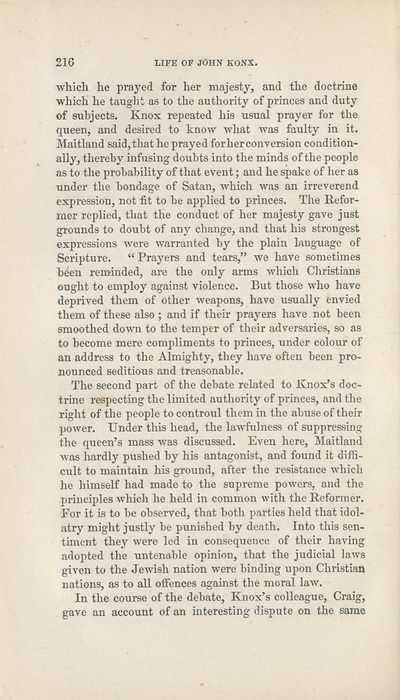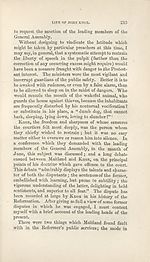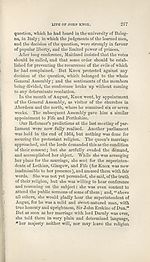Download files
Complete book:
Individual page:
Thumbnail gallery: Grid view | List view

216
LIFE OF JOHN KONX.
which he prayed for her majesty, and the doctrine
which he taught as to the authority of princes and duty
of subjects. Knox repeated his usual prayer for the
queen, and desired to know what was faulty in it.
Maitland said, that he prayed for her conversion condition¬
ally, thereby infusing doubts into the minds of the people
as to the probability of that event; and he spake of her as
under the bondage of Satan, which was an irreverend
expression, not fit to be applied to princes. The Refor¬
mer replied, that the conduct of her majesty gave just
grounds to doubt of any change, and that his strongest
expressions were warranted by the plain language of
Scripture. “ Prayers and tears,” we have sometimes
been reminded, are the only arms which Christians
ought to employ against violence. But those who have
deprived them of other weapons, have usually envied
them of these also ; and if their prayers have not been
smoothed down to the temper of their adversaries, so as
to become mere compliments to princes, under colour of
an address to the Almighty, they have often been pro¬
nounced seditious and treasonable.
The second part of the debate related to Knox’s doc¬
trine respecting the limited authority of princes, and the
right of the people to controul them in the abuse of their
power. Under this head, the lawfulness of suppressing
the queen’s mass was discussed. Even here, Maitland
was hardly pushed by his antagonist, and found it diffi¬
cult to maintain his ground, after the resistance which
he himself had made to the supreme powers, and the
principles which he held in common with the Reformer.
For it is to be observed, that both parties held that idol¬
atry might justly be punished by death. Into this sen¬
timent they were led in consequence of their having
adopted the untenable opinion, that the judicial laws
given to the Jewish nation were binding upon Christian
nations, as to all offences against the moral law.
In the course of the debate, Knox’s colleague, Craig,
gave an account of an interesting dispute on the same
LIFE OF JOHN KONX.
which he prayed for her majesty, and the doctrine
which he taught as to the authority of princes and duty
of subjects. Knox repeated his usual prayer for the
queen, and desired to know what was faulty in it.
Maitland said, that he prayed for her conversion condition¬
ally, thereby infusing doubts into the minds of the people
as to the probability of that event; and he spake of her as
under the bondage of Satan, which was an irreverend
expression, not fit to be applied to princes. The Refor¬
mer replied, that the conduct of her majesty gave just
grounds to doubt of any change, and that his strongest
expressions were warranted by the plain language of
Scripture. “ Prayers and tears,” we have sometimes
been reminded, are the only arms which Christians
ought to employ against violence. But those who have
deprived them of other weapons, have usually envied
them of these also ; and if their prayers have not been
smoothed down to the temper of their adversaries, so as
to become mere compliments to princes, under colour of
an address to the Almighty, they have often been pro¬
nounced seditious and treasonable.
The second part of the debate related to Knox’s doc¬
trine respecting the limited authority of princes, and the
right of the people to controul them in the abuse of their
power. Under this head, the lawfulness of suppressing
the queen’s mass was discussed. Even here, Maitland
was hardly pushed by his antagonist, and found it diffi¬
cult to maintain his ground, after the resistance which
he himself had made to the supreme powers, and the
principles which he held in common with the Reformer.
For it is to be observed, that both parties held that idol¬
atry might justly be punished by death. Into this sen¬
timent they were led in consequence of their having
adopted the untenable opinion, that the judicial laws
given to the Jewish nation were binding upon Christian
nations, as to all offences against the moral law.
In the course of the debate, Knox’s colleague, Craig,
gave an account of an interesting dispute on the same
Set display mode to:
![]() Universal Viewer |
Universal Viewer | ![]() Mirador |
Large image | Transcription
Mirador |
Large image | Transcription
| Antiquarian books of Scotland > Scotland/Scots > Life of John Knox ; and, The life of Alexander Henderson > (234) |
|---|
| Permanent URL | https://digital.nls.uk/131835112 |
|---|
| Description | Thousands of printed books from the Antiquarian Books of Scotland collection which dates from 1641 to the 1980s. The collection consists of 14,800 books which were published in Scotland or have a Scottish connection, e.g. through the author, printer or owner. Subjects covered include sport, education, diseases, adventure, occupations, Jacobites, politics and religion. Among the 29 languages represented are English, Gaelic, Italian, French, Russian and Swedish. |
|---|

